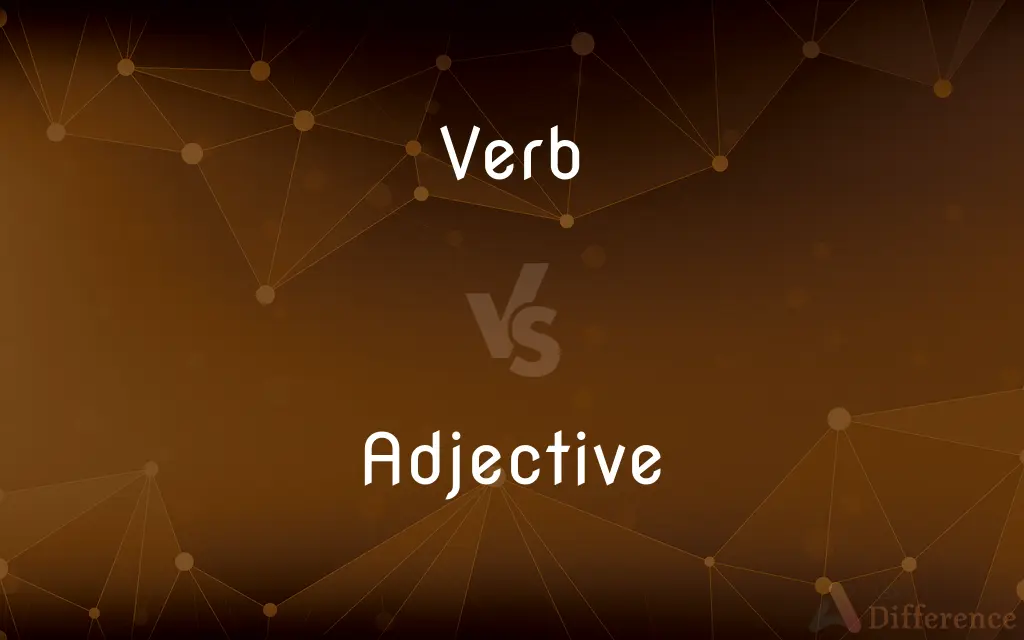Verb vs. Adjective — What's the Difference?
By Tayyaba Rehman — Updated on October 31, 2023
A verb is a word expressing action or a state of being, while an adjective is a word describing or modifying a noun.

Difference Between Verb and Adjective
Table of Contents
ADVERTISEMENT
Key Differences
A verb represents action, occurrence, or existence. It is a critical component in sentence construction. An adjective, on the other hand, describes or modifies a noun, providing more detail or information about it.
Verbs are conjugated to express tense, showing when an action takes place, like past, present, or future. Adjectives do not change form based on tense; they remain consistent regardless of the time aspect.
In a sentence, verbs are essential for indicating what the subject is doing or what is happening to the subject. Adjectives primarily focus on giving qualities, characteristics, or additional information about the nouns or pronouns they modify.
Verbs can also express a state of being or existence, like "is," "are," or "was," which are known as linking verbs. Adjectives can be graded to express degrees, like "big," "bigger," "biggest," providing comparative and superlative forms.
Action verbs are dynamic and depict activities, such as "run," "jump," or "think." Adjectives can also be descriptive, quantitative, demonstrative, possessive, or interrogative, serving different functions in modifying nouns.
ADVERTISEMENT
Comparison Chart
Function
Expresses action, occurrence, or state of being.
Describes or modifies a noun.
Form Variation
Conjugated for tense.
Remains consistent, not affected by tense.
Role in Sentence
Indicates what the subject is doing or its state.
Provides qualities or additional information about nouns.
Types
Includes action verbs, linking verbs, etc.
Includes descriptive, quantitative, demonstrative, etc.
Grading
Generally not graded.
Can be graded (comparative, superlative forms).
Compare with Definitions
Verb
He is a talented artist.
Connects the subject to more information.
Adjective
Used in questions related to nouns.
Which option do you prefer?
Verb
They seem happy together.
Helps the main verb express action or a state.
Adjective
Indicates possession or belonging.
Her voice is mesmerizing.
Verb
I have finished my work.
Requires an object or doesn't.
Adjective
Describes qualities or characteristics of a noun.
The beautiful garden was breathtaking.
Verb
He builds houses.
She sleeps peacefully.
Adjective
Points out specific nouns.
This book is interesting.
Verb
She can run very fast.
Expresses a state of existence.
Adjective
In linguistics, an adjective (abbreviated adj) is a word that modifies a noun or noun phrase or describes its referent. Its semantic role is to change information given by the noun.
Verb
A word that describes an action or occurrence.
Adjective
The part of speech that modifies a noun or other substantive by limiting, qualifying, or specifying and distinguished in English morphologically by one of several suffixes, such as -able, -ous, -er, and -est, or syntactically by position directly preceding a noun or nominal phrase.
Verb
A verb (from Latin verbum 'word') is a word (part of speech) that in syntax conveys an action (bring, read, walk, run, learn), an occurrence (happen, become), or a state of being (be, exist, stand). In the usual description of English, the basic form, with or without the particle to, is the infinitive.
Adjective
Any of the words belonging to this part of speech, such as white in the phrase a white house.
Verb
A word used to describe an action, state, or occurrence, and forming the main part of the predicate of a sentence, such as hear, become, happen.
Adjective
Adjectival
An adjective clause.
Verb
Use (a word that is not conventionally used as a verb, typically a noun) as a verb
Any English noun can be verbed, but some are more resistant than others
Adjective
(Law) Specifying the processes by which rights are enforced, as opposed to the establishing of such rights; remedial
Adjective law.
Verb
The part of speech that expresses existence, action, or occurrence in most languages.
Adjective
Not standing alone; derivative or dependent.
Verb
Any of the words belonging to this part of speech, as be, run, or conceive.
Adjective
(grammar) A word that modifies a noun or noun phrase or describes a noun’s referent.
The words “big” and “heavy” are English adjectives.
Verb
A phrase or other construction used as a verb.
Adjective
(obsolete) A dependent; an accessory.
Verb
(grammar) A word that indicates an action, event, or state of being.
The word “speak” is an English verb.
Adjective
(grammar) Adjectival; pertaining to or functioning as an adjective.
Verb
(obsolete) Any word; a vocable.
Adjective
(legal) Applying to methods of enforcement and rules of procedure.
Verb
(figurative) An action as opposed to a trait or thing.
Kindness is a verb, not an adjective. You're only kind if you do kind things.
Adjective
Needing the use of a mordant to be made fast to that which is being dyed.
Verb
(programming) A named command that performs a specific operation on an object.
Adjective
Incapable of independent function.
Verb
To use any word that is or was not a verb (especially a noun) as if it were a verb.
Adjective
(transitive) To make an adjective of; to form or convert into an adjective.
Verb
To perform any action that is normally expressed by a verb.
Adjective
To characterize with an adjective; to describe by using an adjective.
Verb
A word; a vocable.
Adjective
Added to a substantive as an attribute; of the nature of an adjunct; as, an adjective word or sentence.
Verb
A word which affirms or predicates something of some person or thing; a part of speech expressing being, action, or the suffering of action.
Adjective
Not standing by itself; dependent.
Verb
A word that serves as the predicate of a sentence
Adjective
Relating to procedure.
Verb
A content word that denotes an action or a state
Adjective
A word used with a noun, or substantive, to express a quality of the thing named, or something attributed to it, or to limit or define it, or to specify or describe a thing, as distinct from something else. Thus, in phrase, "a wise ruler," wise is the adjective, expressing a property of ruler.
Adjective
A dependent; an accessory.
Adjective
To make an adjective of; to form or change into an adjective.
Language has as much occasion to adjective the distinct signification of the verb, and to adjective also the mood, as it has to adjective time. It has . . . adjectived all three.
Adjective
A word that expresses an attribute of something
Adjective
The word class that qualifies nouns
Adjective
Of or relating to or functioning as an adjective;
Adjectival syntax
An adjective clause
Adjective
Applying to methods of enforcement and rules of procedure;
Adjective law
Adjective
Shows quantity or amount.
Several people attended the event.
Common Curiosities
What is a linking verb?
A linking verb connects the subject with more information about it.
Are all verbs action words?
Not all; some verbs express states of being, like "is" or "feel."
Do adjectives change with tense?
No, adjectives remain the same regardless of tense.
Are there different types of adjectives?
Yes, there are various types, including descriptive, quantitative, demonstrative, and more.
What is an adjective?
An adjective is a word that describes or modifies a noun.
Can adjectives be used to compare?
Yes, adjectives can have comparative and superlative forms for comparison.
What's a transitive verb?
A transitive verb requires a direct object to complete its meaning.
What's an intransitive verb?
An intransitive verb does not require an object.
Can verbs change form?
Yes, verbs change form based on tense, person, and number.
What is a verb?
A verb is a word that expresses action, occurrence, or a state of being.
Do adjectives describe actions?
No, adjectives describe or modify nouns, not actions.
What are possessive adjectives?
Possessive adjectives show ownership, like "my," "your," or "their."
Can adjectives indicate quantity?
Yes, some adjectives, like "many" or "few," indicate quantity.
Can verbs be nouns?
Yes, in their gerund form, verbs can act as nouns.
What role do verbs play in sentences?
Verbs are central to sentences, indicating actions or states and linking subjects with predicates.
Share Your Discovery

Previous Comparison
Evidenced vs. Evinced
Next Comparison
Dial vs. ButtonAuthor Spotlight
Written by
Tayyaba RehmanTayyaba Rehman is a distinguished writer, currently serving as a primary contributor to askdifference.com. As a researcher in semantics and etymology, Tayyaba's passion for the complexity of languages and their distinctions has found a perfect home on the platform. Tayyaba delves into the intricacies of language, distinguishing between commonly confused words and phrases, thereby providing clarity for readers worldwide.














































